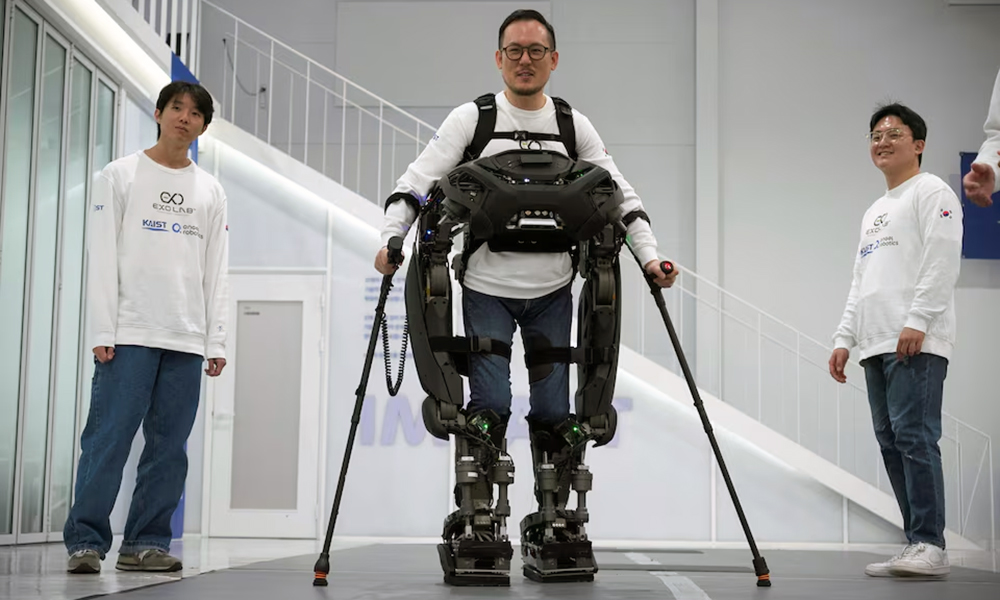Health
South Korean team develops ‘Iron Man’ robot that helps paraplegics walk
Kim Seung-hwan, who is himself a paraplegic and part of the KAIST team, demonstrated the prototype which helped him walk at a speed of 3.2 kph (2 mph), climb a flight of stairs and take sideways steps to slide into a bench.

South Korean researchers have developed a lightweight wearable robot that can walk up to paraplegic users and lock itself onto them, enabling them to walk, manoeuvre obstacles and climb staircases, Reuters reported.
The Exoskeleton Laboratory team at the Korea Advanced Institute of Science and Technology (KAIST) said their goal is to create a robot that seamlessly integrates into the daily lives of individuals with disabilities.
Kim Seung-hwan, who is himself a paraplegic and part of the KAIST team, demonstrated the prototype which helped him walk at a speed of 3.2 kph (2 mph), climb a flight of stairs and take sideways steps to slide into a bench.
“It can approach me wherever I am, even when I’m sitting in a wheelchair, and be worn to help me stand up, which is one of its most distinct features,” Kim said.
The powered exoskeleton, named WalkON Suit F1, features aluminium and titanium composition to weigh in at 50 kg (110 lb), and is powered by 12 electronic motors that simulate the movements of human joints while walking, read the report.
Park Jeong-su, another member of the KAIST team, said he was inspired by the movie “Iron Man”. “After watching Iron Man, I thought it would be great if I can help people with a robot in real life.”
To ensure the user’s balance while walking, the robot is equipped with sensors on its soles and in the upper body that monitor 1,000 signals per second and anticipate the user’s intended movements.
Lenses on the front of the robot work as eyes which analyse its surroundings, identify the height of stairs and detect obstacles to compensate for the lack of sensory ability of users with complete paraplegia, Park said.
Kim Seung-hwan won the gold medal while wearing the WalkON Suit F1 in the exoskeleton category at Cybathlon 2024, which saw developers with varying physical disabilities demonstrate assistive robots in eight categories, Reuters reported.
“I wanted to tell my son …. that I also used to able to walk. I wanted to share a diverse range of experiences with him,” said Kim.
Health
Health ministry holds meeting with envoys of international organizations in Kabul

Noor Jalal Jalali, Minister of Public Health of Afghanistan, held a meeting in Kabul with representatives of the World Health Organization, UNICEF, the World Bank, the Asian Development Bank, the European Union, the UK Foreign, Commonwealth and Development Office (FCDO), and other international organizations.
According to the ministry’s statement, representatives of these international organizations discussed the delivery of health and development services, improving the management of aid and resources in the health sector, integrating health facilities and aligning them with the new policy, providing health services in accordance with the Ministry of Public Health’s policy, strengthening the immunization and vaccination sector, delivering services based on priorities, and ensuring sustained coordination.
During the meeting, Jalali stressed the need for transparency and attention to the ministry’s priorities in order to enhance the effectiveness and impact of health services. He added that the delivery of health services must be carried out in line with the ministry’s policy and through better management of existing international assistance.
Referring to vaccination campaigns, he stated that the recent measles and polio vaccination campaign had been implemented very successfully, and emphasized that necessary preparations should be made for upcoming campaigns.
He also provided information regarding the review of the BPHS and EPHS health packages and the establishment of a standardized system through technical committees.
In this meeting, Edwin Ceniza, the WHO Representative for Afghanistan, reaffirmed the organization’s continued cooperation with the Ministry of Public Health and expressed appreciation to the ministry’s leadership for their tireless efforts to improve the health system.
Representatives of these organizations pledged to maintain effective and sustained coordination and to provide their services within the country in accordance with the policies and principles of the Ministry of Public Health.
Health
IEA health delegation travels to Turkey

Abdul Wali Haqqani, Deputy Minister for Health Services at the Ministry of Public Health of the Islamic Emirate of Afghanistan (IEA), has departed for Turkey on an official visit accompanied by a high-ranking delegation.
According to a statement released by the Health Ministry on Wednesday, the trip aims to acquire new health-sector expertise, assess Turkish medical and scientific institutions, meet with Turkish health and government officials, and strengthen bilateral cooperation.
During the visit, the delegation is scheduled to meet representatives from both public and private health sectors to support improvements in Afghanistan’s healthcare system and enhance coordination between the two countries, the statement added.
Health
Polio vaccination drive launches across 17 Afghan provinces
Officials say routine vaccination remains the most effective tool for eliminating polio and have urged families to fully cooperate with health teams during the campaign.

The Ministry of Public Health has announced the launch of a major anti-polio vaccination campaign, set to begin on Monday across 17 provinces of Afghanistan.
According to Sharafat Zaman, spokesperson for the ministry, the nationwide initiative will target 7.4 million children under the age of five, delivering vaccines door-to-door to prevent the spread of the poliovirus and safeguard children’s health.
Officials say routine vaccination remains the most effective tool for eliminating polio and have urged families to fully cooperate with health teams during the campaign.
This effort forms part of the government’s ongoing strategy to protect Afghanistan’s next generation from preventable diseases and strengthen public health across the country.
This comes after the World Health Organization (WHO) recently again classified the global spread of poliovirus as a Public Health Emergency of International Concern (PHEIC), warning that the disease remains endemic in only two countries — Afghanistan and Pakistan.
The decision followed the 43rd meeting of the Polio Emergency Committee under the International Health Regulations (IHR), which convened on 1 October 2025.
According to the Committee, Afghanistan reported four new wild poliovirus type 1 (WPV1) cases so far this year, compared to 24 in Pakistan.
The Afghan cases were detected in the country’s southern and eastern regions, where transmission remains intense despite ongoing vaccination efforts.
-

 Latest News2 days ago
Latest News2 days agoMuttaqi: Afghanistan’s progress requires both religious and modern education
-

 Sport4 days ago
Sport4 days agoILT20: Desert Vipers edge Gulf Giants in historic super over thriller
-

 Regional4 days ago
Regional4 days agoSix Pakistani soldiers killed in TTP attack in Kurram District
-

 Business4 days ago
Business4 days agoTrade bodies warn almost 11,000 Afghan transit containers stuck at Karachi port
-

 World4 days ago
World4 days agoPowerful 7.6 earthquake hits northern Japan, tsunami warnings issued
-

 Latest News3 days ago
Latest News3 days agoTrump calls Afghanistan a ‘hellhole’ country as US expands immigration restrictions
-

 Sport3 days ago
Sport3 days agoCommanding wins for Arman FC and Sarsabz Yashlar in Afghanistan Champions League
-

 Latest News5 days ago
Latest News5 days agoPakistan’s top general calls on IEA to pick between ties with Islamabad or TTP




















